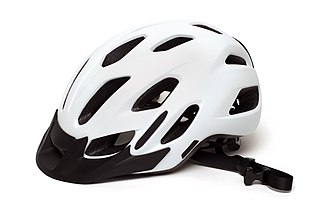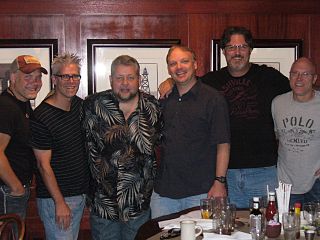
A frequent-flyer program or frequent-flyer programme is a loyalty program offered by an airline.

Western Auto Supply Company—known more widely as Western Auto—was a specialty retail chain of stores that supplied automobile parts and accessories. It operated approximately 1200 stores across the United States. It was started in 1909 in Kansas City, Missouri, by George Pepperdine and Don Abnor Davis. Pepperdine later founded Pepperdine University. Western Auto was bought by Beneficial Corporation in 1961; Western Auto's management led a leveraged buyout in 1985, leading three years later to a sale to Sears. Sears sold most of the company to Advance Auto Parts in 1998, and by 2003, the resulting merger had led to the end of the Western Auto brand and its product distribution network.

A bicycle helmet is a type of helmet designed to attenuate impacts to the head of a cyclist in collisions while minimizing side effects such as interference with peripheral vision.

Cycling in Melbourne, the capital city of Victoria, Australia, is enhanced by the city's relatively flat topography and generally mild climate. The city has an active cycling culture for commuting, recreation, fitness and sport, and the metropolitan area has an extensive network of off-road bicycle paths, as well as designated bicycle lanes on many streets.
A stingray is a type of cartilaginous fish.

The Monterey Bay Aquarium Research Institute (MBARI) is a private, non-profit oceanographic research center in Moss Landing, California. MBARI was founded in 1987 by David Packard, and is primarily funded by the David and Lucile Packard Foundation. Christopher Scholin serves as the institute's president and chief executive officer, managing a work force of approximately 220 scientists, engineers, and operations and administrative staff.
Redline refers to the maximum safe speed of an engine.

Western Flyer was an American country music band founded in 1992 by Danny Myrick, Chris Marion, T. J. Klay, Bruce Gust, Steve Charles, and Roger Helton. The band released two albums for Step One Records, as well as six singles. Their highest peaking single is "What Will You Do with M-E?", which reached No. 32 on the Billboard country charts in 1996. After Western Flyer disbanded, Marion joined the Little River Band, and Myrick began writing songs for other artists.
American Flyer may refer to:
Cycling in Australia is a common form of transport, recreation and sport.
Kookaburra III was the Australian 12 Metre yacht sailed by Iain Murray in the 1987 America's Cup held off of Fremantle, Western Australia. Murray won the Defender Selection and Kookaburra III represented Australia in the America's Cup, where she lost to American challenger Dennis Conner sailing Stars & Stripes 87.

Australia was the first country to make wearing bicycle helmets mandatory. The majority of early statistical data regarding the effectiveness of bicycle helmets originated from Australia. Their efficacy is still a matter of debate.
Diamondback Bicycles is a major bicycle brand that is based in Kent, Washington. Diamondbacks are sold in many countries, including the United States, Australia, Canada, and the United Kingdom. Most Diamondbacks are considered to be mid-type bicycles, with a high-end prototype in development as of 2011. Diamondback is owned by global private equity firm Regent, L.P., which also owns Redline Bicycles.

The Western Flyer is a fishing boat, most known for its use by John Steinbeck and Ed Ricketts in their 1940 expedition to the Gulf of California, the notes from which culminated in their 1941 book Sea of Cortez, later reworked by Steinbeck into The Log from the Sea of Cortez (1951). According to Kevin Bailey, "the most famous fishing vessel ever to have sailed", the 77-foot (23 m) Western Flyer was restored in Port Townsend, WA. The Western Flyer Foundation was formed in its honor with the goal of educating youth about the intersection of science and literature.

New Flyer is a Canadian multinational bus manufacturer, specializing in the production of transit buses. New Flyer is owned by the NFI Group, a holding company for several bus manufacturers. New Flyer has several manufacturing facilities in Canada and the United States that produce the company's main product, the New Flyer Xcelsior family of buses.
Western Flyer was an American private label brand of bicycles, tricycles, scooters, play wagons, and pedal cars and tractors, and roller skates, sold by the former Western Auto stores. The trademark brand was first used in June 1931, and the brand of bicycles was sold until 1998. Western Auto had other companies manufacture the bicycles.
Narputta Nangala Jugadai (1933–2010) was an Aboriginal Australian artist born at Karrkurutinytja, who later lived at Haasts Bluff (Ikuntji) in the Northern Territory. Her language group was Pintupi/Pitjantjatjara, and her Dreaming was "Snake", "Jangala, Two Men" and "Two Women". She was a senior artist in her community at Ikuntji and prominent among the Ikuntji Women's Centre painters. She was the wife of the painter, Timmy Tjungurrayi Jugadai, and mother of Daisy Jugadai Napaltjarri and Molly Jugadai Napaltjarri.








